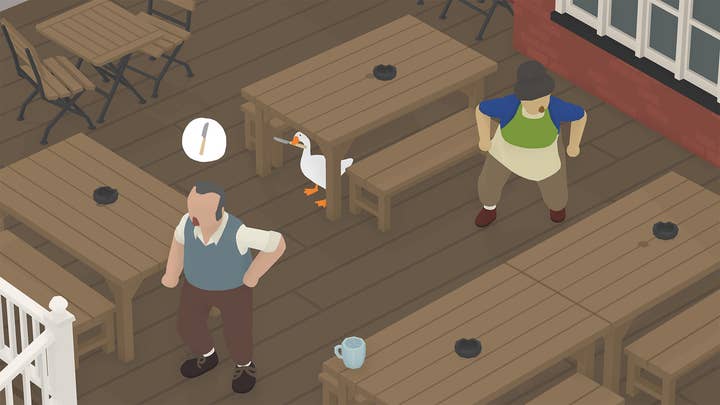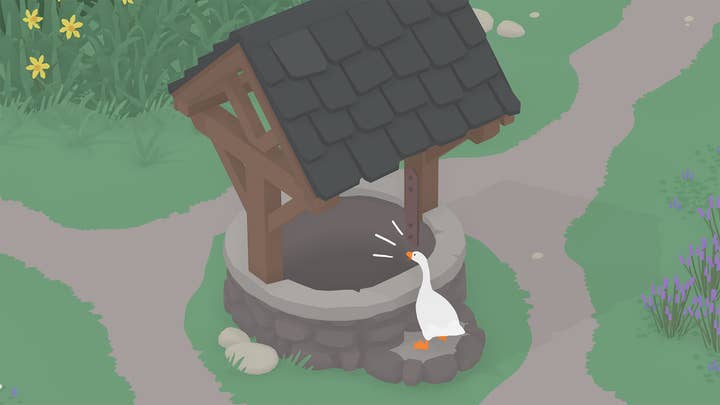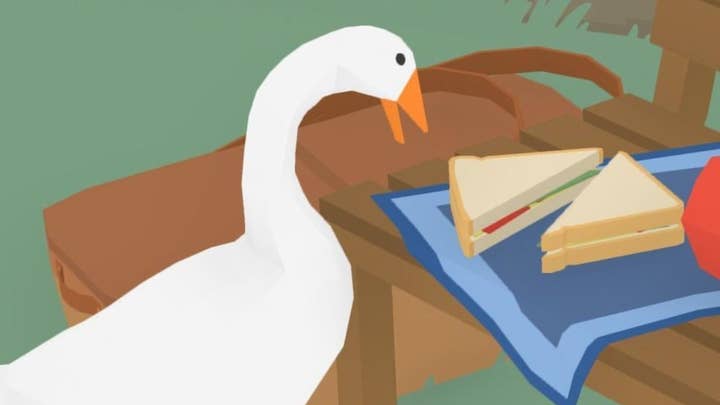Unheadlined Goose Game interview
House House's Jacob Strasser and Michael McMaster on the studio's surprising growth from gosling to gander
Jacob Strasser and Michael McMaster still don't entirely believe they're real, professional game developers.
This is despite having shipped a game of moderate notoriety (Push Me Pull You) and being just one day away from a second release that's getting considerably more flap: Untitled Goose Game.
Strasser and McMaster are one half of Australian studio House House, which McMaster describes as a group of four guys who hung out together and played games with one another and had never made a video game before... until they had. Push Me Pull You, he says, was just a summer project they made for themselves and other friends that slowly morphed into a PlayStation release. "I don't know how professional we are now," he says, "but it felt like a slow process of professionalization."
"We're three years more professional than we were three years ago," Strasser adds.
"For all of Push Me Pull You, we never received a paycheck"
Michael McMaster
Push Me Pull You was not a runaway success. House House's first game was made entirely part-time in "bedrooms and lounge rooms and stuff," according to McMaster.
"We were fitting it in around study we were doing, or day jobs," he says. "A fair bit of that game's marketing was supported through state government funding, so that helped us travel to a few conferences. But for all of Push Me Pull You, we never received a paycheck. It was completely done with day job funding. We got some money [from the game], but it pretty much all stayed in the company. It was not a massively commercially successful game. We didn't expect it to sustain us."
But House House did gain a small amount of notoriety; just enough that when the team posted the first trailer for Untitled Goose Game in 2017, it drew a significant amount of interest. This was a surprise to the studio, as the idea for the game was at the time not much more than a casual joke that fellow team member Stuart Gillespie-Cook put on Slack one day. They ran with it on a whim.
"As we were wrapping up production on Push Me Pull You, we had a bunch of different ideas flying around," McMaster says. "We were really interested in moving into 3D and doing something with single-player. We liked the idea of a third-person, Mario 64-esque game.
"At some point, Stuart posted a picture of a goose in our Slack and said, 'Let's make a game about this.' This was in mid-2016 I think. We all talked about how funny we found geese, and it stuck with us for awhile. We got a bit carried away with the idea of, 'What if you're a horrible goose?'"
Strasser says that no one at House House is entirely sure why so many people outside their team think the goose is funny.
"It felt like an in-joke, then we very quickly realized how many people have strong feelings about geese"
Jacob Strasser
"We thought the goose was our joke," he says. "It felt like an in-joke, then we very quickly realized how many people, particularly in the northern hemisphere, have strong feelings about geese. I want to say it's because it's a largely unnoticed part of people's lives, so drawing attention to it is very satisfying in the way a joke can be. We didn't think it'd be as resonant as it was. I'm not sure the reasons we find geese funny are the same as the other reasons other people find geese funny."
Even if the reasons were unclear, the warm reception to the initial trailer and subsequent social media efforts spurred the team to take Untitled Goose Game beyond its status as a group in-joke and develop it into a full game.
"In that very first trailer that we posted it shows this one garden level with this interaction with the gardener, and that was all the game we had at the time," McMaster says. "When we released that trailer, we were fairly ready to just release that one little area as its own thing if it didn't take off. Maybe we just release this thing we made as a little novelty and move onto the next project. But it turned out that people were really into the idea, so we made the decision to expand on it and do the premise justice."
When House House first began working on Untitled Goose Game, they were still experimenting with their earlier ideas of a 3D, Mario-style game. The concept underwent multiple evolutions before it reached the tight, garden setting of its announcement trailer.

"In the same way that our professional careers have developed through gradual snowballing, the game took the same trajectory," says Strasser. "One of the first things I did was make the goose and make a walk cycle. We started off with just the goose in a green field with some people and a couple of rocks around, and let the game develop through prototyping.
"The breakthrough was having the goose and the people look at each other. Those reactions were really rich and interesting"
Jacob Strasser
"We initially thought it might be this big ensemble cast, very dense crowd sim thing... The goose in this fair sort of wreaking havoc, more like Grand Theft Auto style. Lots of anonymous people simulated very systematically. It was this very ambitious vision of a big systemic country fete that in retrospect is very unrealistic. We figured that out fairly quickly."
Strasser adds: "For me, the biggest breakthrough at the start was having the goose and the people look at each other. Interactions at that scale wouldn't have been possible in a GTA-style thing. Those small, personal reactions were really rich and interesting. It made tiny moments very funny. We realized the scale needed to change dramatically into a more personal affair."
That more personal affair turned out to be a bit of a mix between a puzzle game and a stealth game. You play as the titular goose let loose in various populated areas of a quaint English village, and accomplish tasks (usually involving annoying the townsfolk) through a mix of item and environment use and stealth mechanics.
"I don't think we set out to make a stealth game, but that's where we arrived at and it seemed that genre's mechanics supported the kind of experience we wanted to make," says McMaster. "But it was a little bit accidental. We felt our way toward it. It's a game about pranking people and pulling jokes, and I think with stealth games like Hitman, that's kind of the genre. You, as the player, have a lot more information and agency than the people around you, and that's where the humor comes from.
"In a game like Hitman or Metal Gear Solid, it's all about this dramatic irony. I'm sneaking up on this person, they don't know I'm coming, so I have control over the situation. That's kind of the same thing as our game, except rather than choking someone from behind you're stealing their watering can."
"Making a decision before the game was even out that would ensure continued sustainability for our studio was very easy"
Michael McMaster
Though the growth and development of Untitled Goose Game has resulted in a number of shifts from the original vision, one thing that hasn't changed is its placeholder title. Referring to their game as an untitled goose game made perfect sense when House House first published its reveal trailer, but McMaster and Strasser say the joke grew to the point where no other official title made sense.
"I think our official stance is that [Untitled Goose Game is] not the title of the game," McMaster says. "The game is untitled. The game has no title. In really boring terms, it's just the thing everyone calls it now. But also we never found anything that excited us more.
Strasser adds: "It started as a pragmatic decision because we had to release that trailer, and when it got way more attention than we were expecting we had already publicly said the game was untitled. There's no appropriate title for the game, so it's going to stay untitled forever. It's also very funny."

Untitled Goose Game launches tomorrow, and while House House isn't counting its geese before they hatch, preliminary excitement gives reason to be optimistic. For one, social media noise about the game brought it to the attention of a publisher, Panic, that has gotten it to numerous public events and even taken the lead on a lot of goose-themed merchandise. Publisher funding plus some state funding has enabled the team to quit the part-time jobs they relied on through Push Me Pull You and focus on full-time development for the last two years.
McMaster says the decision to take Epic Games' offer for PC exclusivity was a fairly straight forward one for House House.
"It's no secret there's an incentive to partner with Epic and release with them. From our perspective, what that meant was that we could take this very safe bet. We didn't want to assume that any interest in the game would automatically mean we were going to be selling a really successful game through Steam or any other platform. It can be very fickle, and success can feel a bit arbitrary at times.
"Success means we get to continue making games as we have been for as long as we can"
Michael McMaster
"From our perspective as developers who worked without a paycheck for a very long time, being able to make a decision before the game was even out that would ensure continued sustainability for our company and studio was very easy. Being able to sustain our company was a pretty big deal."
Conversely, McMaster and Strasser say the decision to put the game's console release on the Nintendo Switch was (mostly) an emotional choice rather than a business-driven one.
"It's a nice, cute little console that fits our game well," Strasser says. "From a business perspective, PlayStation and Xbox seem like a less good place to be an indie at the moment. The Switch has a lot more people looking for indie games on it."
McMaster adds: "But ultimately, it was just that the Switch is nice and the game is nice and we hope those two things combined can share that warmth or coziness."
House House has managed to secure stability regardless of whether or not Untitled Goose Game is a success. But even if the game is a hit, McMaster and Strasser say the plan is to stay small, stay together, and make more of the games they want to make.
"Success almost definitely doesn't mean we get bigger," McMaster says. "Success means we get to continue making games as we have been for as long as we can."
Strasser adds: "Having some extra funding for Goose Game has meant we can do things like work with a great sound designer and cover those bases where the four of us don't necessarily have the skills."
McMaster concludes: "We're able to offset some of that work to other people, and I think we'd like to do a bit more of that. But success just means being able to work together on games in the future and have this nice life of hanging out with the four of us and making games together. And maybe some holidays would be nice."

